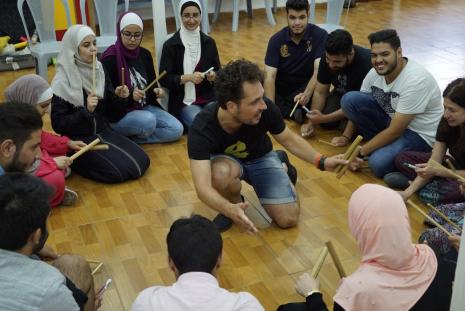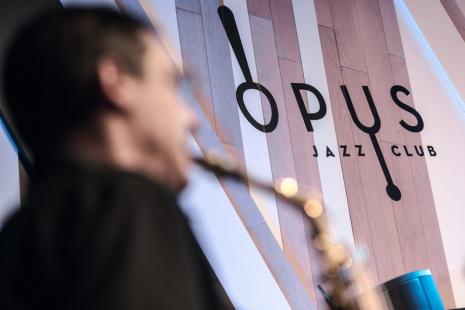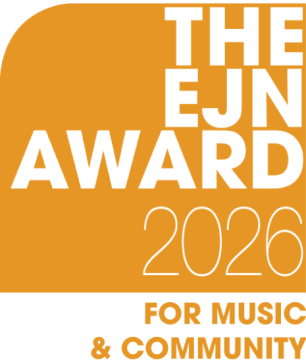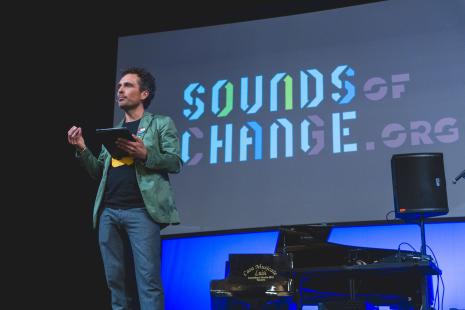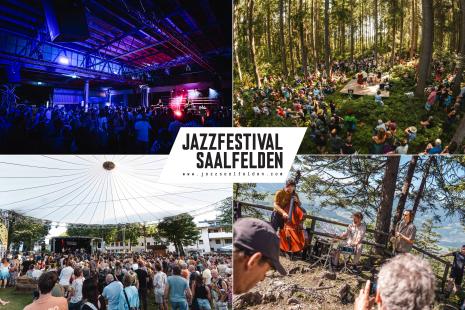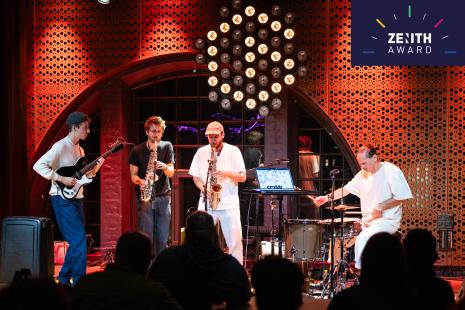Back to list
Taller de Músics in Barcelona has been awarded the 2024 EJN Award for Music and Community for its Taller Obert project, recognising a decade of transformative work with some of the region’s vulnerable residents.
Every Saturday morning, in the Raval neighbourhood, a diverse group gathers to make music together in sessions led by professional musicians. As project leader Àlex Serra and project manager Candela Carrera explain, the music itself is just the beginning: “The most important thing is how they work together as a group. Music is a route, a method that brings people together.”
The organisation's deep roots in Raval have always emphasised the importance of its social role alongside artistic excellence, making Taller Obert a natural extension of its mission.
One participant describes a typical session:
“Well, in the first part, we usually do coordination exercises, body percussion or some kind of game, and we do relaxation techniques… which is good for a group like us. We divide up into combos, and in each combo, both the [music] director and the participants contribute with songs and work on songs.. we share and learn to make them in a certain way; we learn to play collectively, and all this is already another experience.”
The project works with people with experience of homelessness, addiction, imprisonment, or people seeking refugee status - those who have been marginalised. Participants come to the project via referrals from a network of partner organisations, and are often at various stages of recovery. A group of people with very different backgrounds and experiences, but with some needs and pressures in common.
The support extends beyond Saturdays too, with an active WhatsApp group providing an important support network throughout the week. Public transport tickets are also provided so everyone can get to the session.
The impact of this support resonates in the testimonials from participants: “It has brought me connection, more desire. Every time with music I have a stronger connection with myself,” shares one participant. Another reflects: “It is a space where I can relate to music, which is a passion I have had for many years. It has brought me stability in a certain emotional way and of all kinds.”
As Xavier Martínez, the principal artist of the project, explains: “The professional team, beyond the great musical quality it has, is made up of people with great sensitivity who know how to work with people who are not musicians.”
For the professional musicians involved, the work is profoundly meaningful. “They have a strong trust in the project and they want to be part of it long-term,” says Àlex, “to be in an equal relationship, and contribute to positive changes for people who have strong needs and are experiencing instability. And they know how to detect some tough situations and how to deal with them and speak openly with participants.”
Two concerts take place each June and December, together with volunteer musicians. These events have a deep meaning for participants, their relatives and friends and are also an important part of the Taller Obert approach. “Our work is from classroom to stage,” says Candela.
The project tries to manage this, regularly checking in with participants, individually and in small groups, to understand how they’re feeling and what they are dealing with outside the sessions. This helps them spot potential issues early on.
Àlex recalls one participant with outstanding musical talent whose early release from prison, and the excitement of a new music-related opportunity, led to a relapse.
The team draws on experiences like this to learn. “We don't measure impact in a scientific way,' explains Àlex. “We work with them case-by-case, it’s ultimately a human relationship.”
Successes are also shared. For example, when someone leaves because they have got a job, participants are encouraged to share this with the group. “The nice thing is to say goodbye to all participants in a personal way.”
Xavier Martínez reflects on what makes this approach so powerful: “The strong bond established through music is above all the personal background that each person carries. A sincere relationship of respect is established where no one questions and everyone accepts each other. People who would never meet in life, or whom we think could never do complex things, can do them - and this has a very big personal repercussion for them, as it breaks down stigmas and prejudices.”
Candela explains that the project is made possible each year “through the support of two institutions that guarantee the creation and long-term value of Taller Obert - the Department of Justice and Democratic Quality of the Catalan Government, along with support from Aena’s partnership programme.”
Above all, Taller Obert’s approach matters deeply to participants. As one explains: "What music gives you is the possibility of power, of being able to work from within on all the things that you are experiencing because of the outside."
It's a testament to how the project creates change for people through music, consistent support, and above all a focus on human connection.
Image credits: Maud Sophie Andrieux
EJN Music and Community Award 2024: From breakfast to breakthroughs
From breakfast to breakthroughs
Creating connection through music
Taller de Músics in Barcelona has been awarded the 2024 EJN Award for Music and Community for its Taller Obert project, recognising a decade of transformative work with some of the region’s vulnerable residents.
Every Saturday morning, in the Raval neighbourhood, a diverse group gathers to make music together in sessions led by professional musicians. As project leader Àlex Serra and project manager Candela Carrera explain, the music itself is just the beginning: “The most important thing is how they work together as a group. Music is a route, a method that brings people together.”
A 360-degree approach
The project is part of Taller de Músics, a pioneering music school established in 1979. Known for jazz, modern popular and flamenco music, its approach spans education, performance, recording and social projects. “It's a 360 degrees music institution," says Candela. “So we are a school of music, we do festivals, we also run social projects.”The organisation's deep roots in Raval have always emphasised the importance of its social role alongside artistic excellence, making Taller Obert a natural extension of its mission.
Inside the open workshop
While Taller de Músics runs several social programmes, Taller Obert - which translates from Catalan as 'open workshop' - has developed its own distinct approach since beginning in 2015.One participant describes a typical session:
“Well, in the first part, we usually do coordination exercises, body percussion or some kind of game, and we do relaxation techniques… which is good for a group like us. We divide up into combos, and in each combo, both the [music] director and the participants contribute with songs and work on songs.. we share and learn to make them in a certain way; we learn to play collectively, and all this is already another experience.”
The project works with people with experience of homelessness, addiction, imprisonment, or people seeking refugee status - those who have been marginalised. Participants come to the project via referrals from a network of partner organisations, and are often at various stages of recovery. A group of people with very different backgrounds and experiences, but with some needs and pressures in common.
Building trust
But the music-making is just one part of Taller Obert’s approach. Breakfast is an integral part of each Saturday session - a seemingly simple thing that proves crucial for building trust. “That time is important,” notes Àlex, “where they speak much more openly about life and what they are dealing with.” This creates what staff describe as an equal relationship between professionals and participants as human beings.The support extends beyond Saturdays too, with an active WhatsApp group providing an important support network throughout the week. Public transport tickets are also provided so everyone can get to the session.
The impact of this support resonates in the testimonials from participants: “It has brought me connection, more desire. Every time with music I have a stronger connection with myself,” shares one participant. Another reflects: “It is a space where I can relate to music, which is a passion I have had for many years. It has brought me stability in a certain emotional way and of all kinds.”
Equal relationships
This emphasis on connection reflects Taller Obert's carefully developed approach. The professional musicians who lead sessions are selected not just for their musical abilities but for their personal skills and their understanding of music’s potential to create positive change.As Xavier Martínez, the principal artist of the project, explains: “The professional team, beyond the great musical quality it has, is made up of people with great sensitivity who know how to work with people who are not musicians.”
For the professional musicians involved, the work is profoundly meaningful. “They have a strong trust in the project and they want to be part of it long-term,” says Àlex, “to be in an equal relationship, and contribute to positive changes for people who have strong needs and are experiencing instability. And they know how to detect some tough situations and how to deal with them and speak openly with participants.”
From classroom to stage
As well as the Saturday sessions, other activities take place, including trips to musical productions and some personalised training in workshops and master classes.Two concerts take place each June and December, together with volunteer musicians. These events have a deep meaning for participants, their relatives and friends and are also an important part of the Taller Obert approach. “Our work is from classroom to stage,” says Candela.
Meeting challenges
The reality of working with people in vulnerable situations brings distinct challenges. Some participants may disengage without explanation, particularly during difficult periods like Christmas.The project tries to manage this, regularly checking in with participants, individually and in small groups, to understand how they’re feeling and what they are dealing with outside the sessions. This helps them spot potential issues early on.
Àlex recalls one participant with outstanding musical talent whose early release from prison, and the excitement of a new music-related opportunity, led to a relapse.
The team draws on experiences like this to learn. “We don't measure impact in a scientific way,' explains Àlex. “We work with them case-by-case, it’s ultimately a human relationship.”
Successes are also shared. For example, when someone leaves because they have got a job, participants are encouraged to share this with the group. “The nice thing is to say goodbye to all participants in a personal way.”
Creating genuine human connection
For organisations looking to develop similar programmes, Taller Obert's experience suggests that the key lies not in the music itself, but in creating the conditions for genuine human connection. The one piece of advice Àlex and Candela would pass on is “not to focus on musical abilities but on equal human relationships and helping to create a network for participants.”Xavier Martínez reflects on what makes this approach so powerful: “The strong bond established through music is above all the personal background that each person carries. A sincere relationship of respect is established where no one questions and everyone accepts each other. People who would never meet in life, or whom we think could never do complex things, can do them - and this has a very big personal repercussion for them, as it breaks down stigmas and prejudices.”
Looking ahead
Taller Obert marks its tenth year in 2025, and it's this long-term commitment that's been crucial to its success. The team is already looking ahead, planning innovations while maintaining their core approach - which they say will continue "probably forever."Candela explains that the project is made possible each year “through the support of two institutions that guarantee the creation and long-term value of Taller Obert - the Department of Justice and Democratic Quality of the Catalan Government, along with support from Aena’s partnership programme.”
Above all, Taller Obert’s approach matters deeply to participants. As one explains: "What music gives you is the possibility of power, of being able to work from within on all the things that you are experiencing because of the outside."
It's a testament to how the project creates change for people through music, consistent support, and above all a focus on human connection.
Image credits: Maud Sophie Andrieux

